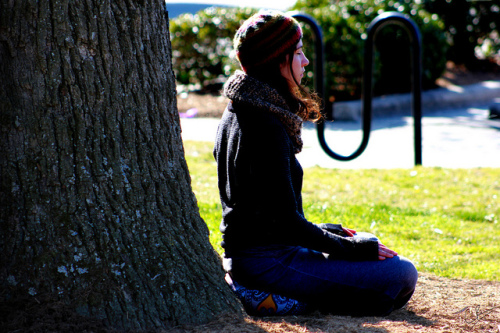College brims with fun and excitement. Inside and outside of the classroom, one is often stimulated by professors, other students and books. It is essentially a vacation with work, a change from the confines of home and its restrictions.
But it is also a stressful environment, enlightening but also taxing on the brain and, for some, even the body. Work is burdensome, even for those who enjoy it.
Since psychological and other mental health services can be expensive and time consuming, college students should know that there is a cheap and easy way to transcend the burdens placed on them: meditation.
A 2005 Harvard study concluded that meditation not only reduces stress, but also increases cortical thickness, improving memory and awareness. A study in the General Hospital Psychiatry Journal found that meditation can have positive, long-term effects in the treatment of anxiety disorders.
Meditation can work for anybody. If you are competitive, it will give you the edge needed to outperform your peers. If you are just looking for some relaxation time, it could replace a nap. Adopting an ideology is not necessary, nor do you have to spend huge heaps of money.
All you need is some time and a little patience. Think about meditation like brushing your teeth or going to the gym, except that it is a check on your well-being, not your teeth or muscles.
I practice a form of meditation called “Transcendental Meditation,” or TM for short. The process is organic and simple; I close my eyes for 20 minutes, twice a day.
During those 20 minutes I repeat a mantra given to me by an instructor. That word allows me to combat the stress accumulated throughout the day.
If you are familiar with The Beatles, this is the form of meditation they learned when visiting the Maharishi in India, and it served as inspiration for The White Album. Paul McCartney and Ringo Starr still practice it to this day, and they support charities like the David Lynch Foundation that provide free meditation lessons to the underprivileged.
It is the premier meditation choice for celebrities such as Oprah, who famously had her whole staff learn it. Popular figures like Jerry Seinfeld, Katy Perry, Ivanka Trump and Moby all practice this type of meditation.
Learning how can be costly, but once you learn, it is very effective. If you learn now, you get a student discount, which I highly recommend.
I can sincerely say that if it were not for meditation, I would not have even survived freshman year.
College is filled with opportunities to meditate. There are meditation centers scattered around the city, retreat houses and personal teachers.
Try doing it in a group. Some studies have concluded that group meditation is more powerful than individual meditation. To those of you who over scheduled, sleep 20 or 30 minutes less than you normally do and meditate.
Transcendental Meditation, specifically, is proven to be three times more restful than basic sleep.
To those of you who worry about the difficulty of meditation, don’t. Anything is better than nothing, and practice makes perfect. As Shia LaBeouf once said, “Just do it!”
Go try it for yourself. Go online and look up different meditation types.
Even if it is a short breathing exercise in the morning, you will feel better. Whatever your problem is — no sleep, short-term stress, long-term stress, a hangover or maybe it is just another day and you need to relax — There are strong arguments to show that meditation will help.
Benedict Carrizzo, FCRH ’18, is an English and communication and media studies double major from Kings Park, New York.





